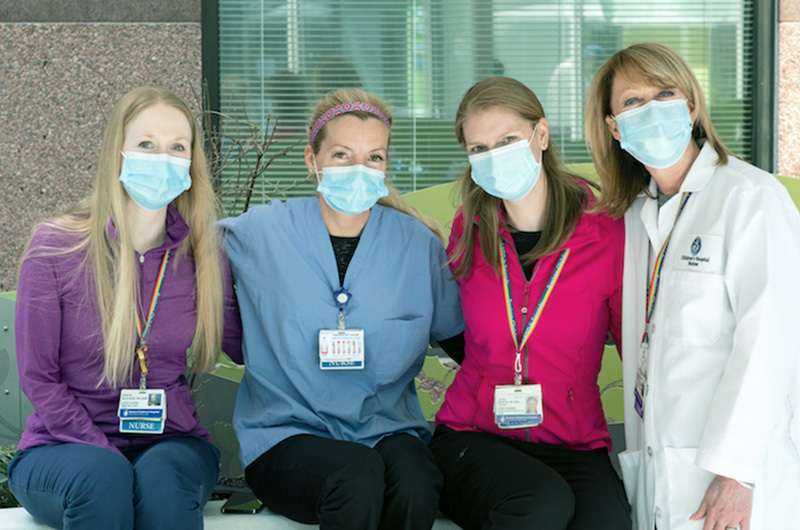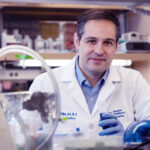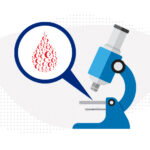Nurses Week 2021: Integrating new therapies into nursing practice and patient care delivery

A revolution in pharmacological gene therapy is underway, as indicated by a significant acceleration in the creation of new therapies to treat genetic disorders at the molecular level. Boston Children’s Hospital Nursing and extended team members, in collaboration with hospital researchers and scientists, biotech, and biopharma partners, have developed a set of specific processes to meet the challenges inherent in launching these groundbreaking treatments.
Nurses at the forefront of novel therapy care
A group of registered nurse-led teams has been focused on bringing these new treatments to patients, particularly SPINRAZA® (nusinersen) for children with spinal muscular atrophy (SMA) and KYMRIAH® (tisagenlecleucel) for children with refractory or relapsed acute lymphoblastic leukemia (ALL). These teams develop first-of-their-kind administration guidelines, delivery models, and educational and documentation standards to create streamlined processes that include:
- Coordinating inpatient care for patients, including patient monitoring and education
- Staff education
- Acting as the clinical provider
- Arranging clinical services for national and international patients receiving gene therapies
The Boston Children’s team mobilizes when a new drug or treatment becomes available and is being considered for use within a specific patient population. “Nurses are at the table from day one with physicians, scientists, and pharmacists anticipating what patients need, developing clinical pathways and workflows, and ensuring the right processes are in place,” says Patricia Pratt, MA, BSN, CPHQ, NE-BC, vice president and associate chief nurse for pediatric/medical and behavioral health nursing and patient care operations.
More than 80 patients treated
To date, the team has worked with 65 children receiving SPINRAZA® therapy and 24 patients treated with KYMRIAH®. “We have established processes to support interprofessional rounding with a strong focus on patient safety and quality,” says Mary-Jeanne Manning, MSN, PPNP-BC, CCRN, an advanced practice registered nurse and pediatric critical care nurse practice specialist in the Medical-Surgical Intensive Care Unit.
“We continue to support the care team to incorporate new processes and clinical workflows into their care.”
Currently, there are several gene therapy products in use, with hundreds more in the pipeline. A recent addition is a gene therapy called ZOLGENSMA® (onasemnogene abeparvovec-xioi), the latest novel treatment for SMA. Zolgensma was approved by the U.S. Food and Drug Administration (FDA) in May of 2019 as a one-time gene therapy infusion with curative intent. The team’s prior experiences provided the infrastructure to smoothly obtain the drug, develop protocols and treat the hospital’s first ZOLGENSMA® patient within six weeks of the FDA’s approval.
Now, another 24 patients are receiving this groundbreaking therapy. “I feel fortunate to work in an environment where we have the opportunity to help bring leading-edge, life-changing treatments to pediatric patients from around the world,” says Kathleen Holmes, BSN, RN, CPN, a staff nurse in the Center for Ambulatory Treatment and Clinical Research (CAT/CR).
Translational research integrated into care delivery
The FDA has forecasted that as many as 25 new gene therapy products may be approved each year through 2025. These numbers are encouraging for nurses on the team, who have commented that working in a clinical environment where translational research is integrated into the care delivery model is one of the most rewarding parts of their job.
As Kelsey Doherty, BSN, RN, CPHON, a staff nurse in Hematology/Oncology, reflects, “Each time I deliver CAR-T cells to my patients, I can feel an immense amount of gratitude and wonder, similar to what our patient and families describe during times where it can be challenging to find hope. The amount of strength, resiliency, and joy you can find in a pediatric oncology patient is truly immeasurable.”
Learn more about the Gene Therapy Program.
Related Posts :
-

The journey to a treatment for hereditary spastic paraplegia
In 2016, Darius Ebrahimi-Fakhari, MD, PhD, a neurology fellow at Boston Children’s Hospital, met two little girls with spasticity and ...
-

Treatment for the vision condition achromatopsia helps Aiden embrace the outdoors
A lot of things excite 10-year-old Aiden Flaherty: drums, soccer, skiing, video games. But lately, he’s also found joy ...
-

Sickle cell gene therapy and boosting fetal hemoglobin: A 75-year history
Ed. Note: This post updates an earlier post from 2018. In a landmark decision today, the Food and Drug Administration (FDA) ...
-

Here’s how genetic vision testing can help your family
At least 600 of the roughly 20,000 genes in the human body are needed for normal eyesight. Changes in those genes can ...





